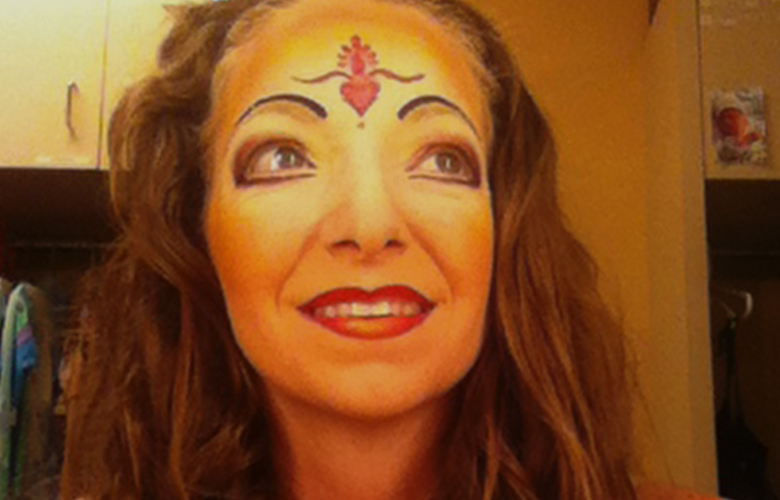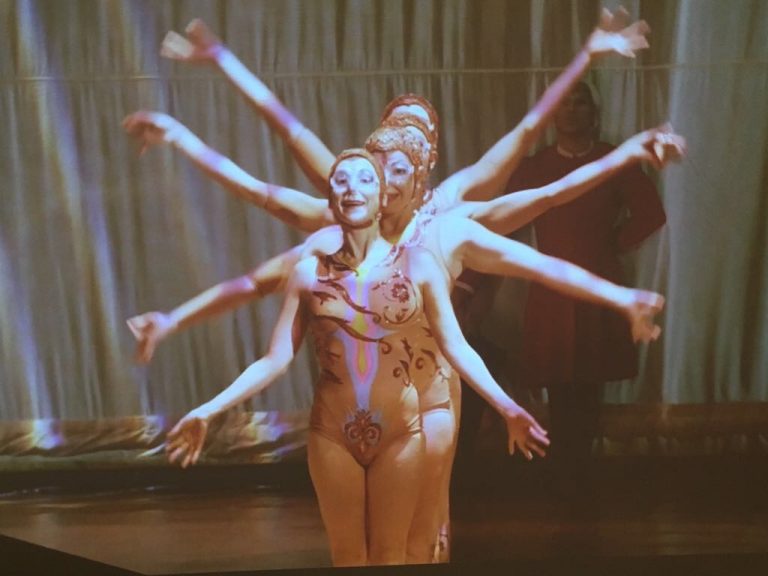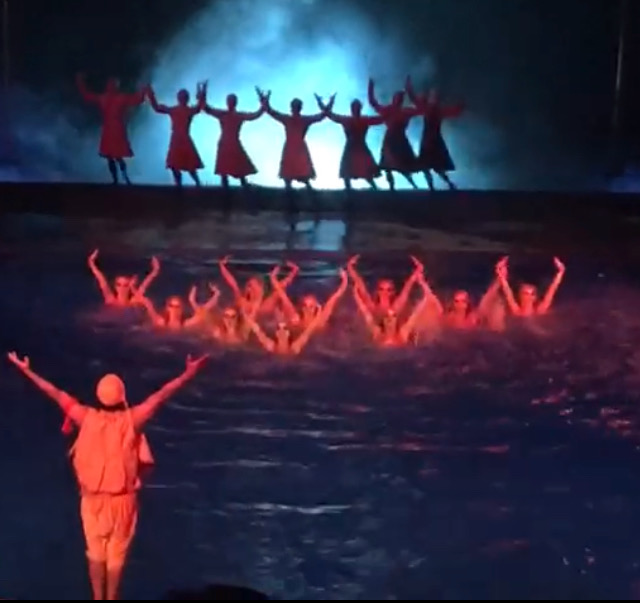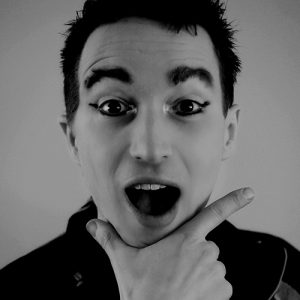
“Long time performers aren’t going to find creativity on stage every night, it is no longer an exploration place, rather a repeating one, so you need to look for creation and exploration opportunities elsewhere.”
You can hear Suzannah Bianco smile and passion filling her voice as she’s sharing those awakening words.
“No amount of people can say the right inspiring thing. Consequently, it is up to me to keep myself inspired by recognizing and taking full advantage of every creation opportunity that comes my way. I’m applying the same make-up and still enjoying performing in ‘O’ after 20 years because I choose to. I could not live without the expectation and anticipation of playing 10 times per week.”
Listening to the Californian synchronized swimmer and feeling the joy that performing is bringing to her life, her confession that playing always was the priority over competing doesn’t come as a shock nor does her very early fondness for her sport’s performance aspect.
“I always was a very driven athlete, but the biggest source of fun definitely came from those occasional shows we’d put on at our club. I was particularly proud of my first solo, of having worked through stress and countless hard training hours to present my routine. Yet, back then, it still felt like a game as I’d imagine myself walking out as a little rooster, chin up and very proud on the deck.”

From Rome to Melbourne, Suzannah spent seven years traveling the world with the national US team and perfecting her acting skills. She quotes, “The difference between what a swimmer feels and presents is like night and day! You must act to offer a polished presentation that hides that your thighs and lungs are on fire!”
Her acting skills were put to a bigger test in 1991, when her team moved to Paris for two full months of performances, underwater dramaturgy and character work. The show was Sirella, an aquatic production where routines were weaved by a storyline and driven by emotions, rather than a perfect 10.
For the young swimmer who had grown up watching Esther Williams’ movies, Sirella was a very inspiring interlude that took her out of her habits and comfort zone. Following this, she literally dove back into the competition season’s fall conditioning with the Olympics in mind.
“The Olympics… It’s that one time in your life, a culminating point. You have to be singularly-focused with such an ambitious dream. It is the only way you’ll get to stand on that podium.
“So, regardless of how inspiring Paris and the show had been, I knew that I had to be back in regular training when the leaves started changing colours.”
Having reached her ultimate goal and knowing that she could not dedicate herself to another 4-year stretch of 6 to 8 hours of daily pre-Olympic training, retirement seemed like the next logical step for the San Jose native. Coincidentally, curiosity and a rather unusual audition invitation drove her to a big circus tent in Santa Monica.
“I had heard of Cirque du Soleil, but never seen any of their shows. When I signed up for this very curious audition where we had to sit on hoops, whistle, climb ropes, dance and act, I wondered how any of this related to my sport. They wanted to see what else we could bring to the team. The energy with which they’d talk about this new show was beyond exhilarating and we just knew that we’d be part of something very special!”
Entering this unique 12-month creation process, swimmers had to get the competitors out of them and remove the top of the “what’s possible?” box. They needed to explore their limbs in ways that a competitive athlete can’t.
Material was no longer being created for a perfect score, but to move and inspire an audience of 1800 people.
Working with show’s director Franco Dragone, coach Sylvie Fréchette and choreographer Debra Brown, the swimmers would be asked to move simply in the water, physically interpret sounds and walk across the stage. By doing this, the former Olympians could be what the creators wanted, new water creatures.
Entirely involved in their routine’s conception, the team defined and identified themselves to the movements and the why behind them, even if the audience would never get it.

Still in her early 20’s when she first put on her water creature’s wig of floating hair, the newly inspired young woman transitioned from full-time athlete to an artistic life in the waters of the Bellagio. Cutting 5 seconds of a routine for the good of a theatrical interlude suddenly made sense. Delivering performances that were no longer only about beautiful positions, but about creating visual effects with splashing waters and lights were far more appealing.
Now in her early 40’s, Suzannah is thankful for the strong base and the high level performance quality that she got through sport. As that little rooster pops back into her mind, she smiles and reckons that she definitely is and probably always was, more of an artist. Unlike some of her cast mates who still have this need to perform in the competition scene, nothing in her wants to go back to sport.

“Again, going back to this indispensable inspiration, everyone must find it where they can to fully appreciate the show. Those 6 hours of daily training and master competitions will do it for some. I personally prefer to let my inner athlete and artist intertwine, to be a complete combination of athleticism and art when the red curtain flies away at the top of Act I. Something you don’t want to miss and still amazes me after about 9000 shows!”
Depth in her interpretation, a profound knowledge of the show and her recognition of consistency to body dedication (warm-up, balanced diet, body cares) is the key to Suzannah’s longevity. However, these are only a handful of qualities that this show’s veteran points out to explain her long lasting career.
“Up until six or seven years ago, technical issues wouldn’t stop the show, we’d just improvise and let our characters and artistry save the production. Those moments were the best! It was all play time where the musicians would go into improv jam while we were splashing water around and interacting with characters in a way we normally wouldn’t. Of course safety must come first and the new management no longer wants to risk it. But I simply LOVED those moments and the audience would always be incredibly engaged, off the charts and wouldn’t stop clapping when we’d restart!”
Lastly, the aquatic artist will confide that no matter how old or where she can be, there is always some fear and nervousness following her into the water, even after 37 years of breaststrokes and arabesques.
There are still nights that she gets that little rooster out to present herself in the best of ways, to welcome herself and others into this space of wonders. As she’s getting ready for yet another representation of ‘O’ she somehow turns into a child who’s sharing a secret: “The show’s opening act is my favourite, the swimmers are hiding under the water, in the dark, with those little bubbles surrounding us. Sitting in this whole other world, in this magical place that cannot be found anywhere else, we are getting ready to lure the audience that will often only see half of our body, unaware of what we are hiding in the water.
Always trying and finding inspiration is crucial. I’ve watched people performing acts in the show and having everything I have, but becoming very uninspired and unhappy as time went on. Appreciating, finding and watching the magic happen when that overture music starts is what is keeping me inspired.”
Walking In The Sky: Art Or Stunt?
Danielle Drobny: The Set Design Sells It!


Impassioned by performing arts, Martin Frenette started intensive dance training at a very young age before trading pliés and barres for ropes and somersaults at Montreal's National Circus School. He has spent a decade in Europe, performing in various productions. Circus Monti, Chamäleon Theater, Wintergarten Varieté, Cirque Bouffon, GOP Show Concepts, and the Friedrichsbau Varieté have allowed him to grow artistically and humanly. Martin has also invested time working as an artistic consultant, director, and choreographer for both circus and dance projects. He enjoys splitting his time between Europe, Canada, and the US, working on stage and creating for others. Writing has always been a big passion of his and he's thrilled to share his views on shows, the stage, and what's going on behind the scenes with other performing arts enthusiasts!
Read Full Profile© 2021 TheatreArtLife. All rights reserved.

Thank you so much for reading, but you have now reached your free article limit for this month.
Our contributors are currently writing more articles for you to enjoy.
To keep reading, all you have to do is become a subscriber and then you can read unlimited articles anytime.
Your investment will help us continue to ignite connections across the globe in live entertainment and build this community for industry professionals.